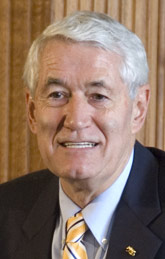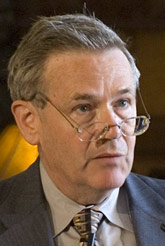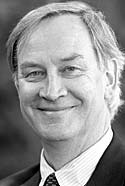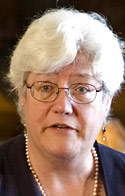BERKELEY – The University of California, Berkeley, today (Monday, Sept. 10) received the largest private gift in its history, $113 million from the William and Flora Hewlett Foundation. This gift represents a turning point in the financing of public higher education, providing endowment support that will help to close the funding gap between the nation's preeminent public university and its elite private peers, according to UC Berkeley Chancellor Robert J. Birgeneau.
The Hewlett gift provides UC Berkeley with a major new source of endowed funds to attract and support world-class faculty and graduate students. Through a challenge grant, it will create 100 endowed chairs, permanent funds designed to keep UC Berkeley professors' salaries competitive with those at the best private schools and to recruit top graduate students. The challenge grant will match other private donations dollar-for-dollar, resulting in $220 million in new endowments once the challenge is met. An additional $3 million will be used to support an enhanced infrastructure for managing those endowed funds.
"This gift is an extraordinary vote of confidence in the contribution that UC Berkeley and all great public universities make to society. It is a recognition that public universities can and must compete with the best private universities and can only do so through a partnership between public funding and private philanthropy," said Birgeneau.

The Hewlett Foundation gift 'is a recognition that public universities can and must compete with the best private universities and can only do so through a partnership between public funding and private philanthropy.'
-Robert J. Birgeneau
UC Berkeley chancellor |
Each year, an increasing number of UC Berkeley professors are receiving lucrative offers from elite private schools. Between 2000 and 2006, the campus retained almost 70 percent of the faculty members with competing outside offers. Of 236 professors, 162 were retained. However, in Birgeneau's view, this success was only achieved through extraordinary efforts and cost-cutting measures that cannot be continued over time.
"If we lose faculty, we may still have a public university, but it won't be the same," said Paul Alivisatos, the Larry and Diane Bock Professor of Nanotechnology at UC Berkeley and a world-renowned pioneer in the field.
"What I see when I'm teaching freshman chemistry is a population that's not ordinary. These are kids from all backgrounds coming to Berkeley, where we offer an opportunity for them to excel in an atmosphere of excellence," he said. "If we lose faculty, we'll have hurt young people who have so much to gain and so much to offer."
According to George Breslauer, UC Berkeley's executive vice chancellor and provost, "Some universities are phenomenal in three or four fields, but we have 35 departments that are ranked in the top 10, nationally. So, we have to invest broadly in order to maintain that breadth and depth of excellence."
In the past two decades, UC Berkeley's state funding — which represents about a third of the campus's annual budget — has remained relatively robust and constant when adjusted for inflation. At the same time, however, endowments at UC Berkeley's leading peer institutions have been producing returns that often have exceeded 20 percent per annum. In addition, the cost of running a major research university continues to rise rapidly. As of the 2006 fiscal year, UC Berkeley's endowment was nearly $2.5 billion. In comparison, in the same period, Harvard University's endowment was nearly $30 billion and Stanford University's was about $14 billion.
"Higher education is an increasingly competitive arena, and private institutions are at an advantage, having traditionally built up large endowments," said Birgeneau. "With only a third of our annual budget coming from state funds, increasing the size of Berkeley's endowment is the only way to sustain a stable financial foundation for the future."

'Berkeley is the crown jewel of public higher education - not just in California, but in the country. The foundation's grant represents our vote of confidence in a truly great institution.'
-Walter Hewlett
Chairman of the board, Hewlett Foundation |
For more than a year, Birgeneau and the Hewlett Foundation held frequent discussions about how the foundation's support could set the stage for a new way for private philanthropy to aid the mission of the country's top public universities. The foundation is known for the high value it places on sustaining and improving institutions that make contributions to society.
"Berkeley is the crown jewel of public higher education — not just in California, but in the country," said Walter Hewlett, chairman of the board of the Hewlett Foundation. "The foundation's grant represents our vote of confidence in a truly great institution."
"Maintaining the high quality of the Berkeley faculty is essential not only to California but to the nation as a whole," added Paul Brest, president of the Hewlett Foundation. "We hope that this grant will help ensure that Berkeley will be able to maintain its excellence long into the future.''
Over the next seven years, the Hewlett Foundation will put $110 million toward establishing the 100 endowed chairs and encourage a wide range of donors to step forward to match its gift, dollar for dollar. With the match, the Hewlett Challenge ultimately will raise $220 million in funding for new chairs. This funding will be spaced across the campus's 14 schools and colleges and represent an almost 50 percent increase over UC Berkeley's current $468 million in endowed chair funding.
UC Berkeley's first academic chair — the Aggasiz Professorship of Oriental Languages and Literature — was established in 1872. There currently are 351 endowed chairs on campus in a wide variety of academic fields ranging from classics to insect biology.
The chancellor said the Hewlett gift for the 100 new chairs "is already generating interest from our friends, who have expressed excitement in participating in this historic challenge."
"There already are donors stepping up to the Hewlett Challenge, and my wife and I plan to be among the first," said Bill Ausfahl, chair of the board of the UC Berkeley Foundation.

'Chairs make a huge difference in the life of individual faculty members, as they provide discretionary funds.'
-Geoff Owen
L&S dean of
biological sciences |
The Hewlett name will not be attached to the new chairs, at the request of the foundation. Instead, each chair may be named for the donor or for someone the donor wishes to honor or memorialize. For each new chair, an eminent professor will be selected as the chair holder and will receive a portion of the earnings generated from the endowment for his or her research.
Neurobiology professor Geoff Owen, dean of the biological sciences in the College of Letters & Science, knows firsthand what an important tool the Hewlett chairs will be in retaining and recruiting faculty. Since he took his post in 2002, he has been faced with 37 retention cases — about seven a year — among his faculty of 120.
"Chairs make a huge difference in the life of individual faculty members, as they provide discretionary funds," said Owen, who researches how the visual world is interpreted by photoreceptors in the retina. "Situations crop up every year where, if you could put your hands on some money, you could make a real difference in your work. If we can wave a prestigious chair in front of somebody, it does make a difference."
Anthropology professor Rosemary Joyce, chair of the Department of Anthropology, said that in addition to higher salaries, the packages being offered to faculty members by UC Berkeley's competitors include cutting-edge research facilities, research budgets for multiple years, library development funds, summer pay, graduate student support — and endowed chairs.

Endowed chairs 'give people a chance to go beyond, to take that extra step and establish new fields. It's hard to get grant funding for something like that, something that's cutting edge.'
-Rosemary Joyce
Anthropology department chair |
"Private universities have much higher proportions of named chairs, and people with chairs are recognized as the leaders of their disciplines," said Joyce, who spent most of her first semester as department chair retaining three professors. "That is a big part of what the Hewlett chairs will do, they will say that the university recognizes leadership. We have a larger proportion of leadership at this academy than at other places, but we recognize a smaller proportion."
The Hewlett gift also provides funding to schools and colleges for recruiting top graduate students, who also are being offered substantial fellowship packages by private schools.
Third-year law student Joshua Daniels, president of the campus's Graduate Assembly, the governing body for graduate students, said the gift to UC Berkeley's endowment "not only will help the campus attract the best graduate students, but it will support those already here."
According to a Graduate Division survey, when the stipend offered by UC Berkeley to a prospective graduate student is greater than or equal to a non-UC competitor's offer, 75 percent of the students choose UC Berkeley. But when it is less, UC Berkeley is chosen by only 15 percent of the students.
"What Berkeley has going for it are two things that can't be downplayed in retention issues," said Joyce, an anthropological archaeologist who specializes in the study of sex and gender in ancient societies of Central America. "One is the quality of our graduate students and the diversity of our undergraduates. The other is Berkeley — the intellectual life and the faculty depth and the notion of being part of the leading department in your discipline."
"The intellectual environment here is so rich," added Owen, "nobody wants to leave it. People here are that good, and when you are surrounded by people who are that good, the exchange of ideas and the excitement of learning is tremendous."
 Smack Solitaire is a collection of 30 different types of Solitaire games. It is one of the most popular games for the Mac crowd.
Smack Solitaire is a collection of 30 different types of Solitaire games. It is one of the most popular games for the Mac crowd.




 Secretaría de Educación Pública
Secretaría de Educación Pública























